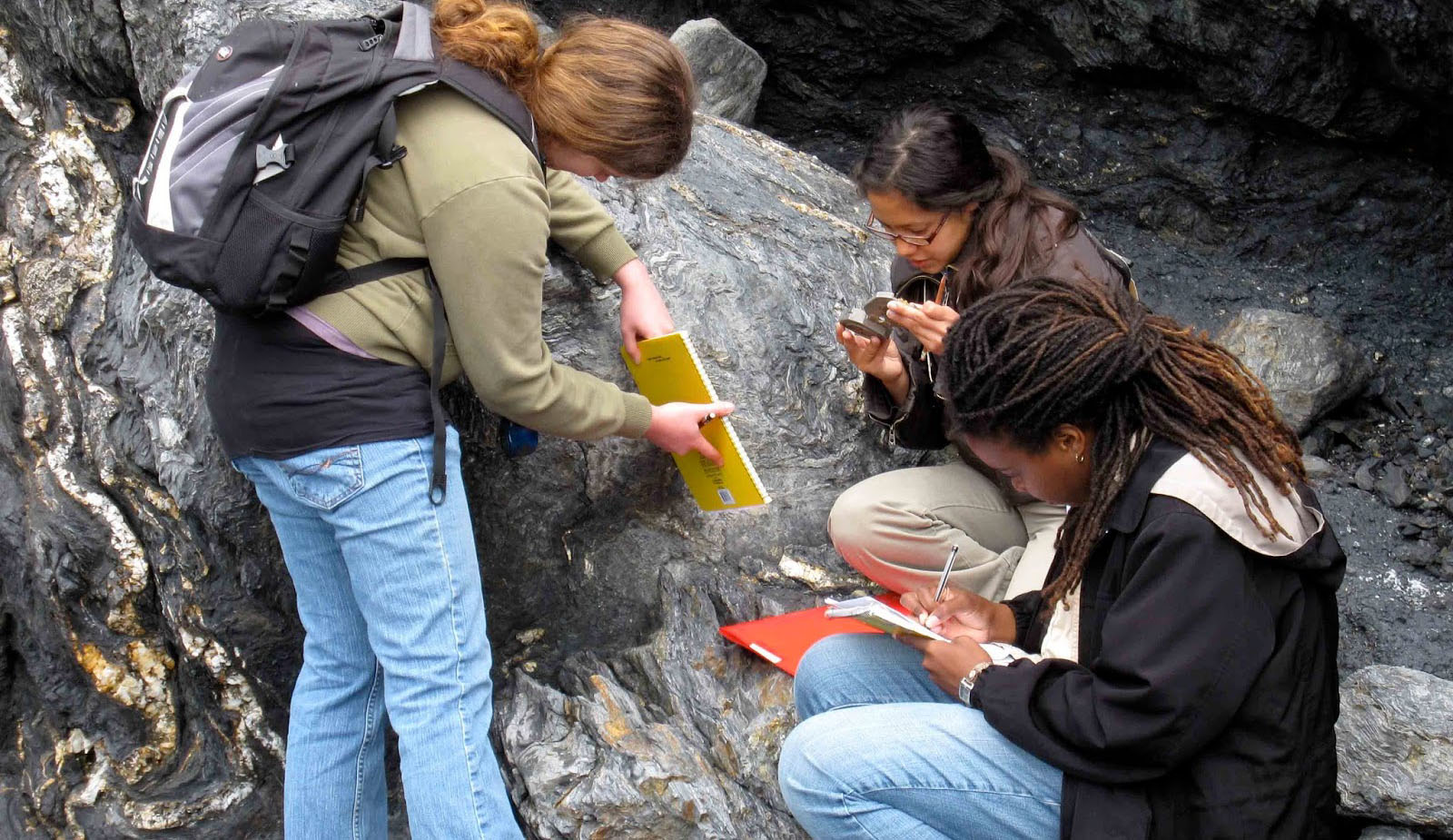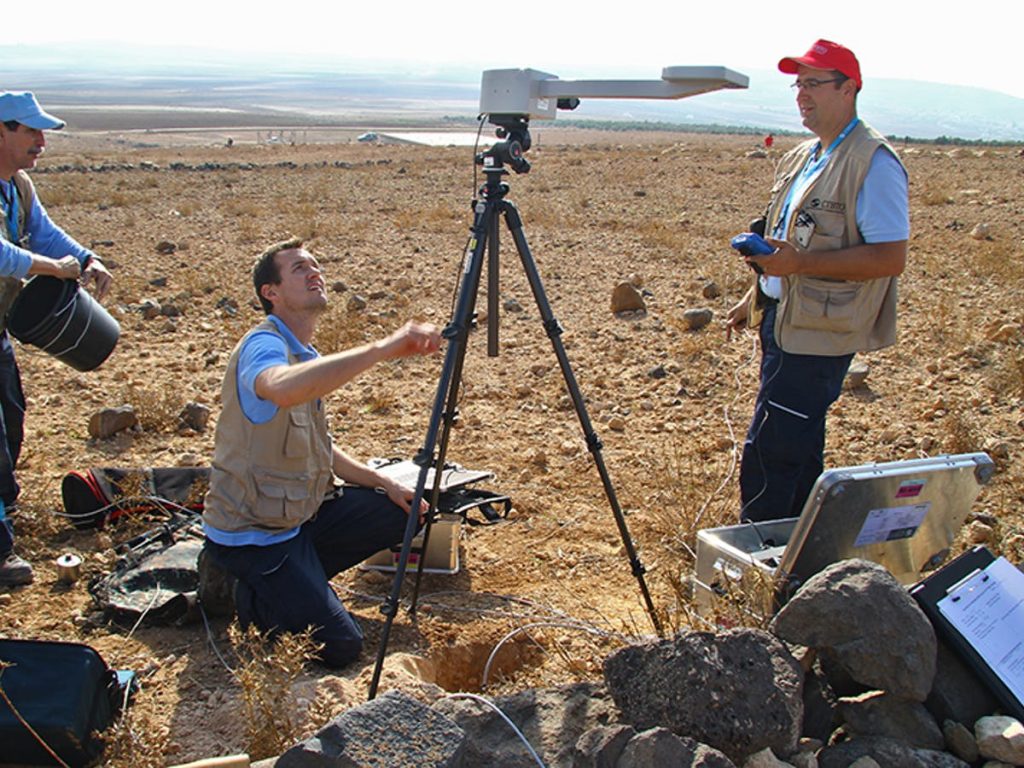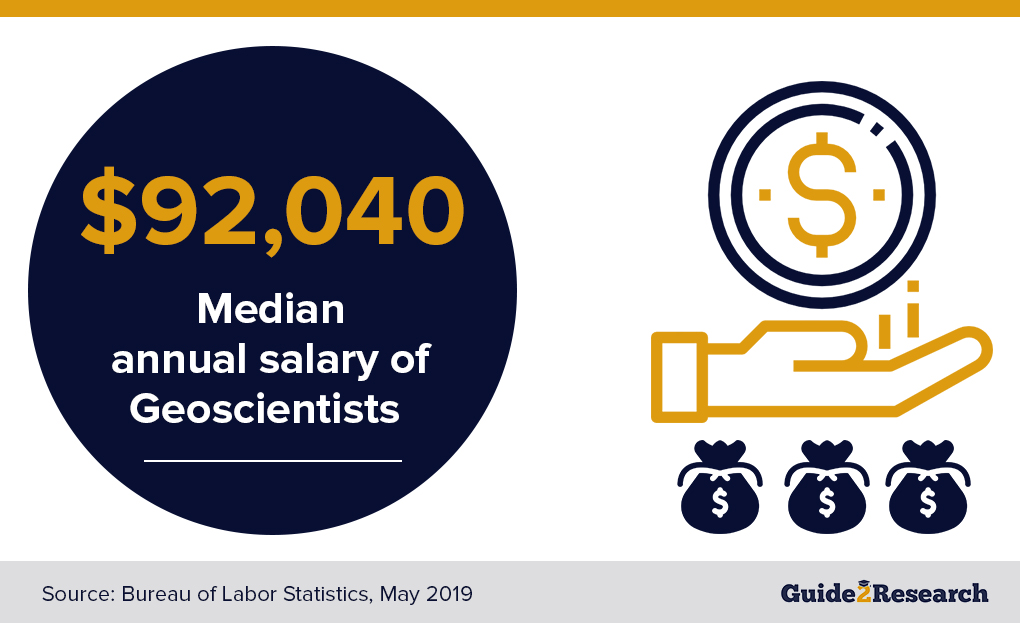If you have obtained your geology degree and are now actively searching for work, we prepared a list of possible geology careers you can use as your starting point. If you are still working on your degree, you can also use our list to start applying for jobs during your last semester.
Most entry-level positions for geologists only require a bachelor’s degree. Your specific job responsibilities will, of course, vary depending on your employer, but working as a geologist often involves fieldwork, doing research and investigations outdoors. Geologists might also need to travel and work in remote locations.

Even before entering college, many geology students already possess substantial nonacademic experiences that fuel their interest in geology. The role of the family, engagement in outdoor recreation, and personal experiences with local geology are the three key components to interest development (LaDue & Pacheco, 2013).
However, personal interest is just the start. Geology students also need to have more than average skills in science and mathematics. It is also important for them to possess excellent writing, public speaking, active listening, and reading comprehension skills. And perhaps, what is not often pointed out is that geologists also need to work on certain social skills to become effective professionals in this field. Coordination, persuasion, negotiation, instructing, service orientation, and social perceptiveness all score high on the value chart (DataUSA, n.d.).3.113.11332.962.964.274.273.233.233.613.61CoordinationPersuasionNegotiationInstructingServiceOrientationSocialPerceptiveness012345
Valuable Social Skills for Geologists/Geoscientists
value in a scale of 5
![]()
Source: DataUSA
1. What Is Geology?
Geology is the study of the Earth’s physical structure and the materials that it is made of. It also studies the forces that act on these materials and how they bring about changes to the Earth’s surface and structure.
Geology helps us understand the history of the Earth, how it was formed, and what structural changes are presently happening. By studying rocks, tectonic plates, the evolution of life, and past climates the Earth has experienced, geologists can more accurately predict what problems the planet and humans may face in the future.
Knowledge in geology can be applied to a wide range of pursuits that are valuable to the protection of the planet and its inhabitants. For example, many classically-educated geologists have found employment as engineering geologists or hydrogeologists (Santi & Higgins, 2005). They evaluate water resources, predict natural disasters, perform mineral and hydrocarbon exploration, and find solutions to environmental problems, just to name a few.
2. Key Geology Statistics
The closest comparable data for geologist employment is from the Bureau of Labor Statistics’ 2018 employment estimate for geoscientists. Geoscientists (excluding hydrologists and geographers) held 29,260 jobs.
The industry that had the highest level of employment for geoscientists was Architectural, Engineering, and Related Services with 8,470 jobs, Oil and Gas Extraction with 4,670, and Management, Scientific, and Technical Consulting Services with 4,080 jobs. The top-paying states for geoscientists are Texas, Oklahoma, Colorado, Louisiana, and Hawaii with an annual mean wage of $150,140, $123,230, $111,130, $109,700, and $109,530 respectively (BLS, 2020).
When it comes to institutions of higher education that have the highest number of degrees awarded in Geological and Earth Sciences, Pennsylvania State University is the top university with 204 degrees awarded in 2017. It is followed by Texas A&M University with 196 degrees, and the University of Houston with 159 (DataUSA, n.d.)150140150140123230123230111130111130109700109700109530109530TexasOklahomaColoradoLouisianaHawaii050k100k150k200k
Highest-Paying States for Geoscientists
mean annual wage
![]()
Source: Bureau of Labor Statistics
3. What are the Requirements to Study Geology?
The training and education to become a geologist can start as early as high school. Students who have good high school GPA and who perform well in subjects like mathematics, physics, biology, and science can increase their chances of getting accepted in geology programs in prestigious universities. As pointed out in a study, students who pursue science majors in college had higher levels of achievement in high school and completed higher-level science and math courses in high school (Dabney et al., 2012, Wang, 2013, cited in Sexton et al., 2018).
What do geology students study in college? They vary depending on the program, but most programs offer fundamental courses in mathematics and science. Molinary (2003, cited in Santi & Higgins, 2005) said that broad-based education in geologic fundamentals is necessary, (and) should include crucial technical areas such as topics in hydrogeology, geomorphology, geographic information systems (GIS), imagery interpretation, field methods and mapping, hazard identification and interpretation, and technical communication skills, especially writing. There are also laboratory courses that may focus on analyzing rocks, fossils, sediments, etc.
4. How Much Does It Cost to Study Geology?
The amount you spend on your geology education will vary depending on where you live and the university you choose. The US, for example, has the highest average cost of tuition among 35 Organization for Economic Co-operation and Development (OECD) countries (OECD, 2017). Bachelor’s programs at American public institutions average $8,202 annually, while in other countries, the average is less than $4,000.
In the US, the most common increases in the cost of college were in the areas of student services, academic support, institutional support, and instruction costs (CATEF, 2020). To know more about the net prices in American colleges and universities, you can visit the College Affordability and Transparency Center. The site has an online calculator and other pertinent information on the cost of programs in different institutions.82028202765476545229522949394939476347634576457642954295309530952420242018301830174517451658165811681168914914USAChileJapanCanadaAustraliaKoreaNew ZealandIsraelNetherlandsSpainLatviaItalySwitzerlandAustria02.5k5k7.5k10kUSA: 8202
Average Annual Cost of College Around the World
![]()
Source: OECD
5. How Long Does It Take to Become an Accredited Geologist?
Though you do not need accreditation to work as a geologist in the US, there 31 states that license geologists when they offer services to the public. These include activities or job responsibilities associated with environmental protection, regulatory compliance, and civil engineering projects. States that license geologists use the National Association of State Boards of Geology (ASBOG), Fundamentals of Geology Exam (FGE).
You can also get a professional certification from The American Institute of Professional Geologists (AIPG). AIPG is the largest geosciences association in the US promoting geology as a profession and certifying geologists based on their competence, integrity, and ethics. You can become an AIPG member to build your professional network. Their membership is categorized into Certified Professional Geologist, Professional, Early Career Professional, Associate, and Student.
6. The Best Universities to Study Geology
The list below is based on The 2020 Times Higher Education World University Rankings for physical sciences. Physical sciences include earth and marine sciences, geology, chemistry, physics and astronomy, and mathematics and statistics.
Princeton University is the top institution in the 2020 ranking. Founded in 1746 and located in New Jersey, USA, it is a leading research institute that today offers undergraduate and graduate education in natural sciences, social sciences, humanities, and engineering.
ETH Zürich is the only European university outside of the United Kingdom to make it into the top 10 of the ranking. ETH is a public research university founded in 1855 in Zürich, Switzerland. It is one of the world’s top institutions for science and technology and has 16 departments conducting research from chemistry to architecture, physics, and engineering.
Peking University is one of the oldest universities in China founded in 1898. It has consistently ranked as a top academic institution in the country and a leading university for scientific research and teaching.
National University of Singapore (NUS) was established in 1905 and supports research themes that include environmental and urban sustainability, energy, and prevention and treatment of common diseases among Asians.
Other universities included in the top 10 are California Institute of Technology, University of Cambridge, Stanford University, Harvard University, Massachusetts Institute of Technology, University of Oxford, University of California, Berkeley, and University of Chicago.
7. How Much Do Geologists Earn?
Geologists fall under the occupation Geoscientist. In May 2019, the median annual salary for geoscientists was $92,040 with an hourly pay of $44.25 (BLS, 2020).
Aside from salary, remember that there are other factors you should consider when evaluating a job offer. Your location, for example, has an impact on whether a salary offer can be considered good compensation. The highest salaries in the US are in San Jose, San Francisco, and several large metros in California. But when adjusted for cost of living, the highest salaries were in small-city metros like Brownsville–Harlingen, Texas; Forth Smith in the Arkansas-Oklahoma border, and Huntington-Ashland in the tri-state of West Virginia, Kentucky, and Ohio (Kolko, 2019).
8. Possible Careers for Geology Majors
Most careers for geology majors fall under the occupation geoscientist. The job outlook for geoscientists is projected to grow 6% from 2018 to 2028. This growth is mainly driven by the need to responsibly manage resources, protect the environment, the need to look for alternative energy resources such as wind and geothermal energy (BLS, 2020).
Different types of geoscientists:
Engineering Geologists
Engineering geologists combine their knowledge of geology with civil and environmental engineering. They work with other professionals mainly on construction projects and public works. They provide their expert advice on the environmental hazards and safety issues related to a project. For example, engineering geologists check flood risk in an area or assess the quality of a site to ensure that it can support heavy structures.
Hydrogeologist
Hydrogeologists study groundwater and the processes involved as it interacts with surrounding rocks and soil. Their expertise can be applied to a wide range of practical uses such as constructing water wells for drinking water supply or irrigation schemes for farmlands.
Hydrogeologists are also experts when it comes to investigating the quality of water, its available supply, and how to design schemes in order to clean up polluted groundwater. Their services are also valuable to geothermal power companies because they can help harness geothermal energy via groundwater-based heat pumps.
Geophysicist
Geophysicists combine the principles of physics, geology, and advanced mathematics to study the Earth’s composition. Some geophysicists choose to focus their studies on the properties of Earth’s gravitational, magnetic, and electric fields. They develop methods and techniques on how to better monitor and predict earthquakes. The oil and gas extraction, engineering, and architecture industries are the top employers of geophysicists.
Geochemist
Geochemists use geology and chemistry to study natural resources such as natural gas and oil and minerals. They also study the chemical elements found in rocks and minerals and how these elements move into soil and water systems. A geochemist’s expertise can be helpful in reducing pollutants in water; thus, increasing water quality in natural reservoirs.
Most geochemists work for environmental agencies, oil companies, and government agencies. They can also be employed at colleges and universities or research facilities.
Oceanographers
Oceanographers explore the ocean floor and study the physical and chemical properties of the ocean. They examine processes that affect ocean waves and currents, coastal areas, weather, and climate. They also study the history of plate tectonics and seafloor spreading, hydrothermal circulation, hydrothermal circulation, magma genesis, mantle circulation, and crustal formation. Oceanographers help us understand how ocean basins are created and the interactions of the ocean and the seafloor.
Since the primary work of oceanographers is research, they often work for research institutions or universities and colleges where they lecture about the ocean and the changes it is undergoing that have an impact on the global environment and the overall health of the planet.
Seismologists
Seismologists study earthquakes and their results such as landslides and tsunamis. They also monitor volcanoes and volcanic eruptions and can also monitor seismic waves to search for underground deposits of natural gas and petroleum.
Most seismologists find employment in observatories or research centers run by national governments. Because of the monitoring aspect of their job, seismologists may need to work long and irregular hours or during public emergencies.
Paleontologists
Paleontologists study the history of life on Earth through fossil remains of plants and animals found in geological formations. These fossil remains can provide valuable information about an organism’s behavior and environment, and its life and evolution.
Paleontologists can work at museums and manage historical exhibits. They can also work for research institutions, universities, oil and gas companies, and mining companies. They can also work as consultants or be employed by the government to create maps and investigate geological issues.
Petroleum geologists
A petroleum geologist’s main job responsibility is to prospect for fossil fuels. They do this by using all the tools and resources available to them to identify and explore sites and test them for the presence of gas and oil. They are also responsible for estimating the size of oil and gas deposits.
Petroleum geologists, naturally, work directly in the oil and gas industry but they can also be employed by mining companies or engineering companies where they provide technical or management consulting services.

9. Famous People Who Studied Geology
Charles Darwin, James Hutton, Charles Lyell, and Alfred Wegener are just some of the influential figures in the history of geology. Darwin is most cited for his contributions in the science of evolution, while Hutton is considered the father of modern geology. Meanwhile, Lyell is a proponent of Hutton’s idea of uniformitarianism, and Wegener is a geophysicist and meteorologist who is the originator of the theory of continental drift.
Interestingly, though he is more widely known as a great painter, Leonardo da Vinci is also a genius who closely studied erosion, sediment, fossils, and stratification of the mountains of northern Italy. He was ahead of the scientists of the 18th and 19th centuries and already guessed through his studies that the Earth is far older than what the book of Genesis claimed (Jones, 2011).
There are also famous contemporary figures who majored in geology and went on to contribute their knowledge to their chosen profession. American politician and retired US Army general, Colin Powell, received his degree in geology from the City College of New York in 1958. Kathryn Dwyer Sullivan, former NASA astronaut and the first American woman to walk in space, and freshwater environmentalist, Sandra Postell, are also geologists.
Starting Your Geology Career
Geoscience industry leaders have identified an impending workforce crisis as a result of baby boomers nearing retirement (LaDue & Pacheco, 2013), and the Bureau of Labor Statistics also projects a 6% job growth in the geosciences (BLS, 2020) from 2018 to 2028. This means, if you are searching for geology careers now, you might just be entering this occupation at a very opportune time.
As we have mentioned, there are several industries that employ the highest number of geoscientists, so the key is to figure out which one best fits your career goals. And when searching for jobs, do not forget to network with people in the industry. Attend lectures and conferences on topics you find interesting. Contacts you make during these events can lead you to your new job considering that 50% of job seekers find out about vacancies from friends, while 37% learn about them from their professional network (Jobvite, 2019).
Finally, understand that there is a chance that you will end up not liking your first job—and that is totally fine! The goal is to literally just get your geology career started. You might not be tasked to manage important projects or the most challenging endeavors where you can apply your geology knowledge. Nevertheless, be conscientious in your work as it can help you gain valuable experiences you can include on your resume.
